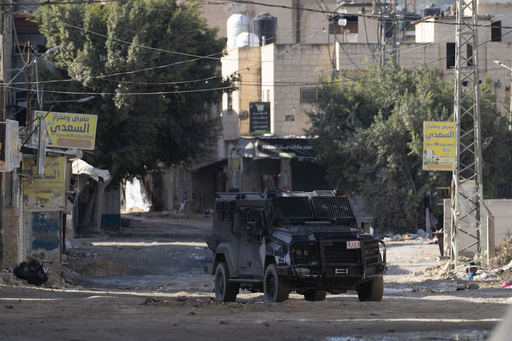JENIN REFUGEE CAMP, West Bank — Gunfire has erupted for several consecutive days in the Jenin refugee camp, located within the West Bank. This time, however, the violence isn’t an altercation between Israeli forces and Palestinian armed groups. Instead, it’s the security forces of the Palestinian Authority (PA) that are in conflict with Palestinian militants.
Earlier this month, the PA launched an uncommon crackdown aimed at addressing the ongoing militancy within the camp, which has historically had little oversight from the Palestinian leadership. Officials from the PA assert that their objective is to restore order in a region known for its militant activities. The PA’s actions have the potential to influence the broader West Bank dynamics significantly. They hope to enhance their governance credentials in the wake of the ongoing war in Gaza, positioning themselves as a legitimate authority amidst rising tensions. However, confronting Palestinians could also exacerbate existing divisions within Palestinian society, especially as many perceive the PA as acting on behalf of Israel.
The conflict has escalated, already resulting in the deaths of at least five individuals. Just weeks ago, the PA’s security forces launched an incursion into the Jenin refugee camp, a known hotbed of militant activity. The area has seen armored vehicles deployed for patrols, and reports indicate that Palestinian security forces have occupied a section of a local hospital, where they have engaged in gunfire. According to estimates, one member of the Islamic Jihad group and three members of the security forces, including a Captain in the intelligence unit, have been reported dead amidst the violence. Additionally, around 50 individuals have been detained, alongside numerous civilian casualties that have impacted the local population.
The Jenin refugee camp itself is home to many Palestinians who were displaced during the 1948 conflict surrounding the establishment of Israel. It has long been recognized as a stronghold of Palestinian militancy, with groups such as Islamic Jihad and Hamas thriving in the area. Streets are adorned with posters commemorating fallen fighters, regarded as martyrs in the struggle for Palestinian rights. The PA primarily controls areas of the West Bank as part of agreements brokered in the 1990s, yet their influence in Jenin remains minimal, often viewed with suspicion by residents who see their actions as aligned with Israeli interests due to ongoing security collaboration.
Jenin and its surrounding areas have consistently been targeted by Israel in efforts to eliminate militant threats. Recent Israeli operations, intensified by the ongoing Israel-Hamas conflict in Gaza, have led to many raids, resulting in significant fatalities and damage to infrastructure within the camp. Since October 7, there have been reports of over 800 Palestinian fatalities across the West Bank, a claim contested as Israeli sources label most as militants, neglecting the deaths of stones-throwing youths and non-combatants.
The current PA operation is presented as an initiative to re-establish order, with officials emphasizing the need to dismantle Iran-affiliated groups that invoke disorder. Brig. Gen. Anwar Rajab stated that this effort aims to eliminate “chaos and anarchy,” with the operation concluding once stability is achieved. However, this clash also underscores the PA’s capability—or lack thereof—to govern effectively in a high-tension area. Considering the uncertainties following the Gaza conflict, the authority’s actions may influence perspectives on its governance potential in the region. President Mahmoud Abbas has proposed forming a committee of neutral technocrats to oversee Gaza’s administration post-conflict, which would report directly to him.
The Biden administration sees a revitalized PA as the most viable option to reestablish governance in postwar Gaza. Washington has heavily invested in training the PA’s security forces, envisioning their return to Gaza as a suitable substitute for Hamas. Conversely, Israel is skeptical; officials regard the PA as insufficiently robust to restrain Hamas’s influence and have pledged to maintain their security presence in the region indefinitely.
For Palestinians themselves, these recent events highlight and exacerbate long-standing internal divisions. The most significant division is the one between Hamas and the Fatah party led by Abbas, which has persisted since Hamas’s rise to power in Gaza. Tensions boiled over in past conflicts, and the inability to achieve reconciliation only solidifies these divisions. The PA, primarily dominated by Fatah members, has sought to curtail Hamas’s influence throughout the West Bank, often with support from Israeli forces. Amidst ongoing calls for unity, the PA’s current crackdown may reinforce perceptions that it serves Israeli interests and erode any public backing it might receive in its anticipated governance of Gaza following the conflict.
